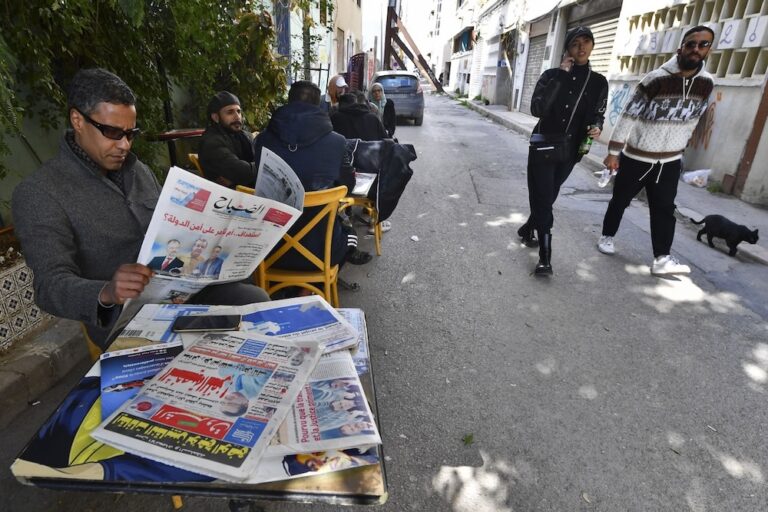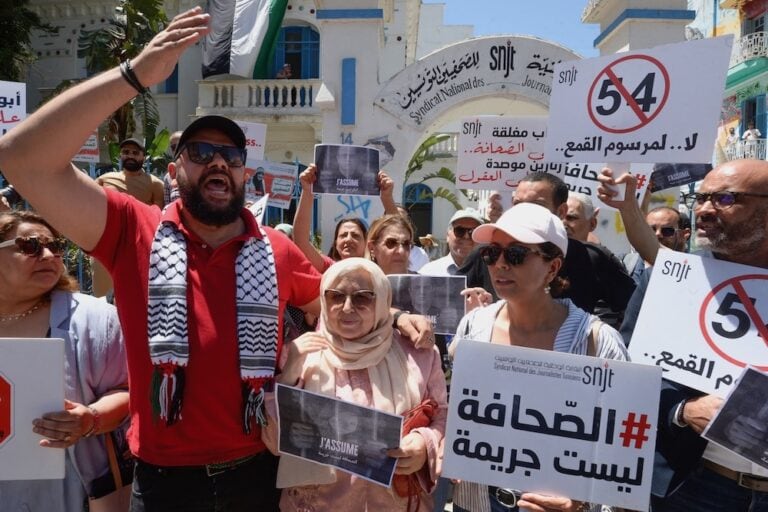Several other journalists also face harassment from the authorities.
(OLPEC/IFEX) – OLPEC is extremely concerned by journalist and writer Taoufik Ben Brik’s declining health. His family, which visited him on 6 January 2010, told OLPEC of a worrying deterioration of his health due to negligence by prison authorities and the poor hygiene conditions to which he has been subjected in Siliana prison, where he was transferred illegally as a retaliatory measure.
His doctors recently published a statement in which they drew attention to the fragility of his health, stating that “his state of health and his hormonal treatment are at the origin of a significant weakness in his immune system. His condition requires regular follow-up and monitoring by a competent medical specialist. Strict hygiene standards must be respected to avoid any deterioration that could threaten his prognosis.”
Ben Brik’s wife, sister and brothers, whose homes are under constant police surveillance, have decided to launch a hunger strike starting on 6 January to protest “this slow death to which he is being subjected.”
Ben Brik was sentenced on 26 November 2009 at the conclusion of an unfair trial to six months in prison for having published articles critical of President Ben Ali in the foreign press during the election campaign.
The October 2009 elections were a time of unprecedented repression by the authorities against journalists who dared to criticise them.
Another journalist, Zouhayr Makhlouf, a correspondent for Assabilonline, is also being held in poor conditions after being sentenced on 1 December by an appeals court to three months in prison and a fine of 6000 dinars (approx. 3175 euros) for producing a video about pollution in an industrial zone. His wife has also been subjected to close police surveillance and has been deprived of the right to visit him from time to time.
In addition, OLPEC notes that acts of harassment toward journalists are continuing:
– On 28 December, Moez Jemai, a Radio Kalima correspondent in Gabes, had his identity documents taken by an individual that he suspects of working with the political police. Immediately after he had an interview with Omar Mestiri, a radio director in Tunis, Jemai was chased after by a political police team that he has encountered before. As soon as he sat down in a restaurant, the individual approached him and took his briefcase, which contained his identity card, passport, IFJ press card and a large sum of money. When he went to the police station to file a report, officers offered him a substantial sum of money in exchange for ending his collaboration with Radio Kalima and promised to recover his identity documents the following day. After he refused, they told him that he would have to wait one year for his documents to be returned.
– On 30 December, Néji Bghouri, president of the National Union of Tunisian Journalists (Syndicat National des Journalistes Tunisiens, SNJT), was prevented from entering his workplace, the state-owned “La Presse”, by several political police agents who said they were following “instructions.” It was necessary for several of his colleagues to leave and refuse to re-enter without him before the police would let him enter. On 31 December, another police unit on the highway from Tunis to Kairouan prevented him from reaching Kairouan, where he was to attend a conference. He was obliged in the end to turn back.
– On 30 December, journalists Faten Hamdi (Radio Kalima) and Slim Boukhdhir (freelance) were attacked by political police, who had banned a meeting to express solidarity with imprisoned journalists Zouhayr Makhlouf and Taoufik Ben Brik organised by the national support committee for journalists. Meanwhile, Lotfi Hajji (Al Jazeera) and Mahmoud Dhaouadi (“La Presse”) were prevented from gaining access to the same premises and harshly insulted by the political police.
– Several journalists and human rights defenders have been the target of a defamation and insult campaign by the pro-government gutter press that has not stopped since the election campaign. They have been accused of being “agents of Israel,” “corrupt” and “prostitutes.” There has been a call for them to be publicly lynched and they have been allegedly accused of being on Hezbollah and Hamas blacklists. One of them, Slim Bragga, received a letter with death threats at his home in Paris.
OLPEC:
– condemns in the strongest possible terms these campaigns, which aim to silence all free voices in Tunisia;
– demands the immediate release of Taoufik Ben Brik and Zouhayr Makhlouf;
– calls for an end to all harassment of journalists;
– reminds the Tunisian state of its international commitments to respect freedom of expression and to protect human rights defenders.
Mohammed Talbi
President, OLPEC


